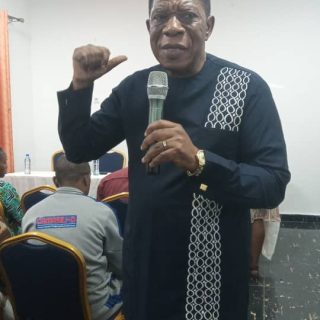SNH Strikes A Loan Agreement Deal Of $ 210 Million (118.2 Billion FCFA) With BGFI, For The Funding Of CSTAR Oil Refinery Project In Kribi
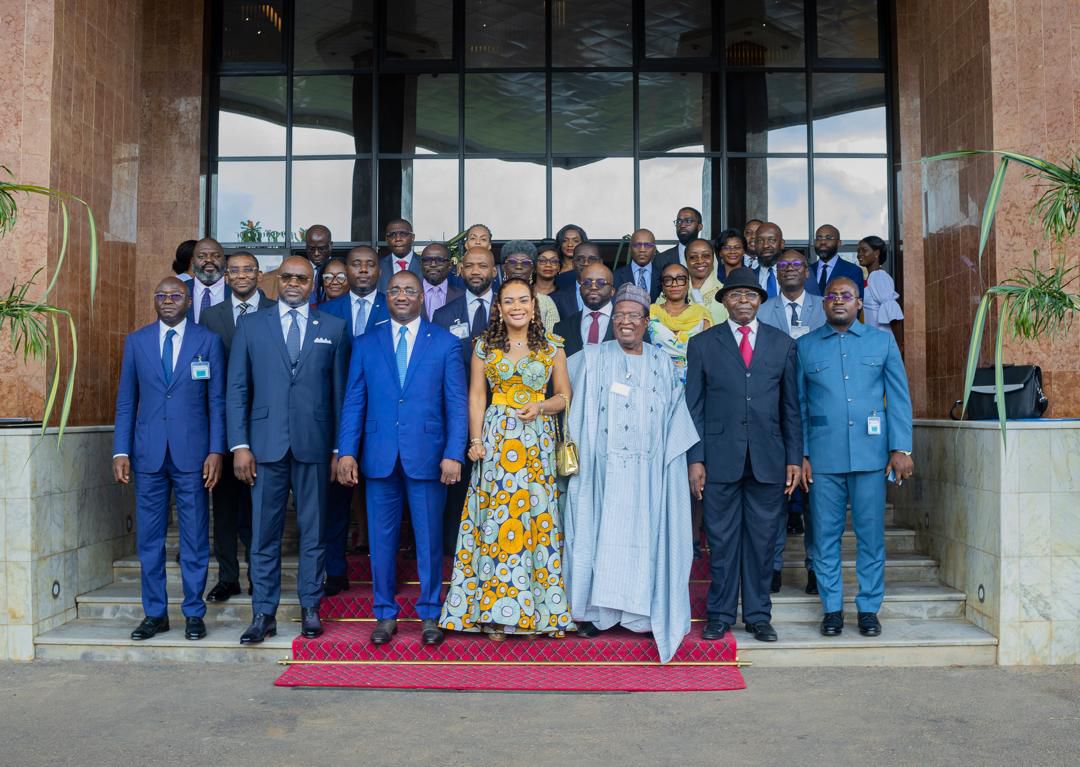
BOCHONG EL HADJ LAWAN BAKO Signed For SNH, While ABAKAR HAMAD Signed For BGFI Cameroun
CSTAR Is A Joint Venture (SNH, TRADEX, ARIANA Energy, and RCG Consortium). The Ultramodern CSTAR Refinery With A Production Capacity Of 50,000 Barrels A Day, Will Start With A Daily Production Of 30,000 Barrels, And Will Provide 2,000 Direct And Indirect Jobs. SNH Will Also Fund A Huge Oil Storage Complex Project, Integrated In The CSTAR Refinery Project.
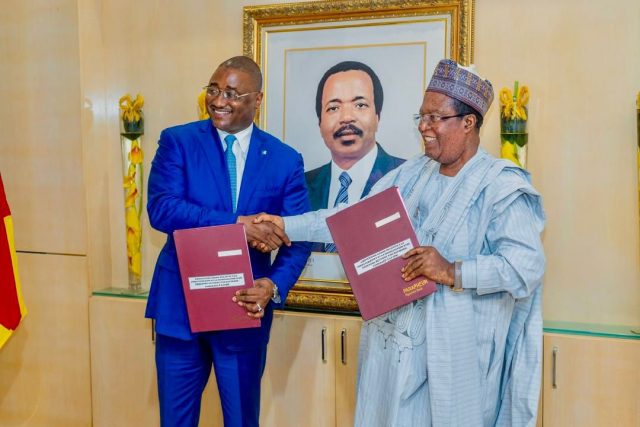
The National Hydrocarbon Corporation, commonly known in the country by its French abbreviation, SNH, has struck a loan agreement deal with a reputed investment bank, ‘Banque Gabonaise pour le Financement Internationale’, BGFI Cameroun SA. The Senior Administrator (Doyen of Board Members) of SNH, Bochong El Hadj LAWAN BAKO, signed for the Corporation, while the Chief Executive Officer, CEO, of BGFI Cameroun, ABAKAR HAMAD, signed for the bank. The loan agreement which was signed in the nation’s capital, Yaounde, is for BGFI to grant a loan of $ 210 million (US dollars), equivalent of 118.2 billion FCFA (One hundred and eighteen billion, two hundred million francs CFA)) to SNH.
BGFI Cameroun will make the funds available in 90 days, that is, in three months, or precisely in February 2026. The money will go to pay for SNH’s own share, in the joint venture to construct an ultramodern oil refinery in the seaside town of Kribi by CSTAR, which is joint venture. CSTAR is comprised of SNH (20 %), TRADEX (30 %), and then ARIANA Energy, and RCG Consortium which have a total of 49 %. Worthy of note that SNH is as well the majority shareholder of TRADEX Petroleum, which runs many filling stations in the country as well as in neighbouring Equatorial Guinea. With SNH and its affiliate, TRADEX, owning a total of 51 % shares of CSTAR, it makes SNH the majority shareholder of CSTAR. The CSTAR Refinery Project will cost a total of $ 621.96 million (US dollars).
Framework Agreement And Arrangement Mandate
Meanwhile, it should be noted that there were actually two documents that were signed by SNH and BGFI Cameroun, at the aforementioned ceremony in Yaounde. According to Pan African Visions, besides the Framework Agreement for the loan of $ 210 million (US dollars), SNH and BGFI Cameroun also signed an Arrangement Mandate, with SNH appointing GBFI Cameroun as Arranger and Agent Bank. BGFI Cameroun will have the responsibility to use its expertise to structure the overall financing plan for SNH’s participation in the CSTAR Refinery Project, with the investment of the $210 million (USD), equivalent of 118.2 billion francs CFA. BGFI Cameroun will also in line with the agreement, provide financial advisory services to SNH, as well as coordinate the entire financial mechanism.

Speaking at the double signing ceremony, NATHALIE MOUDIKI, the representative of the Administrator –Director General of SNH, was quite upbeat that with the signing of the Framework Agreement, SNH has taken another major step towards implementing the highly strategic project (CSTAR), with ambitious, yet realistic objectives. She said the mandate granted BGFI Cameroun, illustrates the determination of SNH’s leadership to advance priority development initiatives aligned with the vision of the President of the Republic, HE Paul Biya.
Big Oil Storage Facility
Meanwhile, in a related development, there is a big project for RCG Turkey, with the technical assistance of partners like GPS and NORINCO, to construct a huge oil storage complex terminal, that is, a Tank Farm Storage Facility, for the CSTAR Oil Refinery. The project, which is to be funded by SNH, is integrated into the CSTAR Refinery Project. The capacity of the oil storage complex will be 250,000 – 300,000 M3.
30,000 Barrels Of Oil A Day
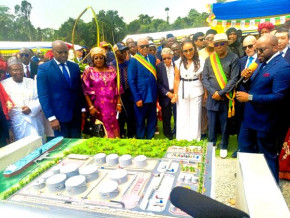
Meanwhile, the CSTAR Oil Refinery, which will refine heavy crude oil, will at the beginning be producing 30,000 barrels of oil, or petrol, a day. The refinery will however have a production capacity higher than 30,000 barrels a day. The production capacity of the CSTAR Oil Refinery will be 50,000 barrels a day. So CSTAR will have the possibility of increasing its daily production, later on. Also worthy of note, that the CSTAR Oil Refinery will provide as many as 2000 direct and indirect jobs.
Cameroonian authorities are quite optimistic that the coming of the CSTAR Oil Refinery, will significantly increase the country’s oil production capacity, and thus reduce the country’s dependence on the importation of oil. In fact it is estimated that CSTAR Refinery which is planned to go operational by June 2028, will reduce Cameroon’s petroleum imports by 30 %. That is huge.
The Importance For An Oil Producing Country To Have More Than One Refinery
The fire incident that in 2019 hit the lone oil refinery in the country, the State owned National oil refinery commonly known by the French acronym, SONARA, has shown how risky, irrational or unwise it is for an oil producing country, to depend on one refinery. The fire incident shutdown SONARA’s oil production till date, Cameroon has thus since been depending 100 % on imported oil or petrol. Even SONARA has also since then been surviving by importing and selling oil, and thus has temporary become an importer of petrol than an oil refinery. The plan to reconstruct or rehabilitate the national oil refinery in Limbe, has dragged on for several years, though there is now said to be some hope that the reconstruction project is finally about taking off. Hope it was not just campaign propaganda for the October 12, 2025 presidential election.
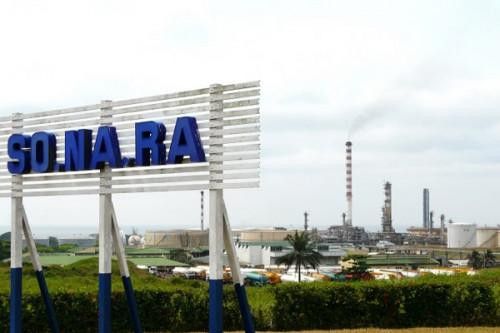
It Is Normal For The Oil Refinery Sector To Be Opened To The Private Sector
Some Cameroonians also see the CSTAR Refinery Project or the opening of the oil refinery sector to the private sector, as detrimental to SONARA. That is not true. In the neighboring oil producing country, Nigeria, for example, the Government has opened up the oil producing sector, to the private sector. This has led the multi- billionaire, Aliko Dangote (Africa’s richest man), to construct a big and modern oil refinery in Nigeria, which has become a big attraction in Africa and beyond. So the coming of CSTAR into the Cameroon refinery sector is just normal. Its futuristic but realistic project is thus supposed to hailed by any good thinking Cameroonian. In a large majority of oil producing countries across the world, the oil refinery sector is also opened to the private sector.
It should be noted that when SONARA was fully operational, Cameroon still used to import oil, because the output of the lone oil refinery, could not meet up with the ever increasing demand in the country.
Unlike SONARA, The State Of Cameroon Is Not Directly Involved In CSTAR
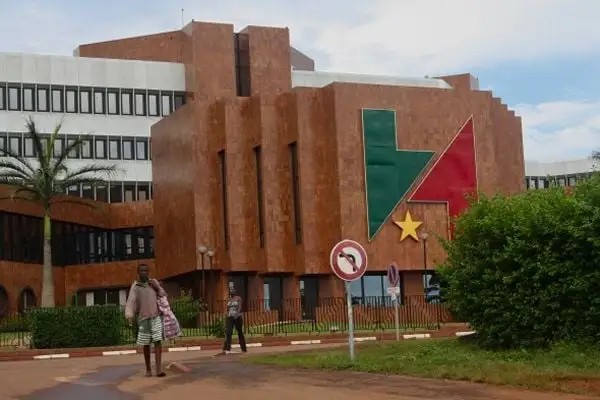
Contrary to the error that some people have also been making, since the ceremony for the laying of the foundation stone of the CSTAR Refinery Project took place in Kribi on July 17, 2025, CSTAR is unlike SONARA, which is a State owned company. The State of Cameroon is not directly involved in CSTAR, and the State will not put in a franc into the project. As aforementioned, CSTAR is a joint venture of four major shareholders (companies). It will be the same thing like TRADEX. It should be noted that TRADEX is not directly owned by the State of Cameroon. Though the State owned company, SNH, is the majority shareholder of TRADEX, there are, a number of other companies, including foreign companies that, are minority shareholders. This is to assert the point that contrary to what some people think, CSTAR will not be a rival or a threat to SONARA. As the Chief of Communication at SNH explained, CSTAR will instead complement SONARA.
It should be noted that State owned companies, have for years have the powers to take profitable initiatives, by for example getting into profitable joint business ventures with other companies, or to diversify their business. When the management of a State owned company takes the initiative and design a new project or a joint venture, the management of the company first presents it to the Board of Directors or Board of Administration of the company. The Board meticulously examine the project, and at the end vote on it. If the majority of Board members vote in favour of the project, it means the Board has approved the project. When the Board Chair signs the project, it is then sent to the President of the Republic for visa. It is thus not the State or Government that initiates such projects for State owned companies.
SNH Board Members Vote To Approve Or Reject A Project
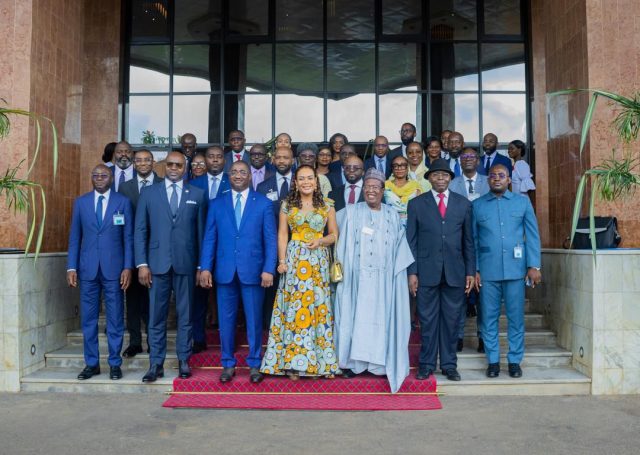
Meanwhile, the National Hydrocarbon Corporation (SNH), has a total of nine Board Members, with eight having voting rights. The Board Chair of SNH who is currently Ferdinand Ngoh Ngoh, Secretary General at the Presidency, has no voting right. Projects presented to the Board by the management of SNH, are approved or rejected by vote, after a meticulous examination of the project by Board Members.
Knowing how some Cameroonians can behave, the Government – approved internal rules and regulation by which SDH operates, states that In a case where the Board Chairman, for one reason or the other, refuses to sign a project that a majority of Board Members have approved by vote, the Doyen of the Board Members, should sign it. So the text gives the Doyen of Board Members of SHN the power to sign a project, in case the Board Chair refuses to do, or is not available. The provision in the text is meant to avoid a situation where a Board Chair might decide to frustrate a project and other Board Members for his selfish interest, by refusing to sign the project, even after the approval of the project by the majority of Board Members.
So the Senior Administrator (Doyen of Board Members) of SNH, Bochong El Hadj LAWAN BAKO, who last June signed the CSTAR Refinery Project that was went to the President of the Republic for Visa, and who also on behalf of SNH signed the loan agreement with BGFI Cameroun, acted within the Law, or better still, acted in line with the powers given him by the Law.




